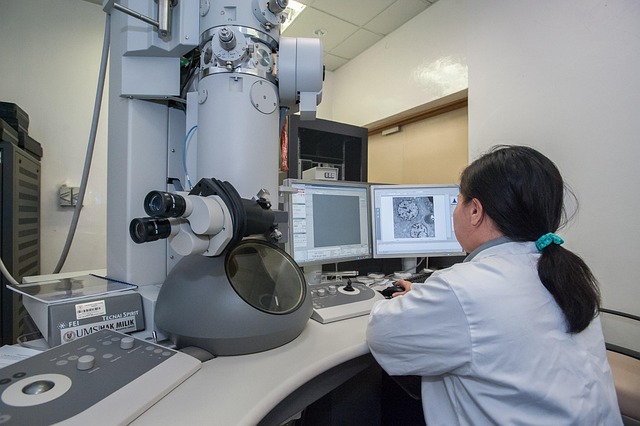In today's globalized scientific community, effective communication fosters collaboration and advances knowledge. Translation services play a pivotal role in bridging language gaps, especially for UK researchers publishing scientific review articles in English and other languages. These services ensure intricate scientific concepts are accurately conveyed to diverse audiences, facilitating international engagement and collaboration. High-quality translations are crucial for UK scientific review articles, enabling global accessibility, knowledge exchange, and diverse perspectives, ultimately enhancing research impact and fostering inclusivity. Reputable translation services with skilled linguists specializing in scientific writing and rigorous quality control measures are essential for maintaining content integrity and readability. As technology advances and the demand for tailored translation grows, investment in these services becomes critical for global scientific progress.
In the UK, understanding scientific reviews is paramount for fostering research advancement and public engagement. However, non-native English speakers often face significant challenges accessing and comprehending these critical articles. This article explores the vital role of translation services in overcoming these barriers, focusing on Translation services for UK Scientific Review Articles. We delve into various aspects, from identifying challenges in scientific communication to highlighting ethical considerations and the impact of accurate translations on research dissemination.
- The Role of Translation Services in Scientific Communication
- Challenges in Understanding UK Scientific Review Articles
- Barriers to Access for Non-Native English Speakers
- Importance of Accurate and Clear Translation
- Types of Scientific Reviews and Their Unique Translation Needs
- Choosing the Right Translation Service for Scientific Content
- Ensuring Quality and Precision in Scientific Translation
- Ethical Considerations in Translating Scientific Literature
- The Impact of Effective Translation on Research Dissemination
- Future Trends in UK Scientific Review Article Translation
The Role of Translation Services in Scientific Communication

In today’s global scientific landscape, effective communication is key to fostering collaboration and advancing knowledge. For UK-based researchers, publishing scientific review articles in both English and other languages can significantly enhance their impact. Translation services play a pivotal role here, ensuring that intricate scientific concepts are accurately conveyed to a diverse readership. By offering professional translation for scientific review articles destined for UK audiences, these services bridge the language gap, making critical research accessible to a wider community of scientists, medical professionals, and interested readers.
Translation is not merely about word-for-word replacement; it involves meticulous adaptation to maintain the original meaning and intent while adhering to the specific terminology and stylistic nuances of each language. When applied to scientific writing, translation services must possess a deep understanding of both the source and target disciplines to accurately translate complex ideas, ensuring that the translated article retains its academic integrity and clarity. This specialized approach enables researchers to reach beyond their native-language peers, fostering international dialogue and collaboration in the scientific community.
Challenges in Understanding UK Scientific Review Articles

Understanding scientific reviews, particularly those from the UK, can be a significant hurdle for researchers and professionals globally. The complexity lies in the intricate language and terminology used within these articles, which often require a deep understanding of the specific field. In the UK, where English is the primary language, scientific literature may still present challenges due to regional variations in vocabulary and idiomatic expressions. This can make it difficult for non-native speakers to grasp the nuances and context of the research presented.
Translation services play a pivotal role in overcoming these barriers. Professional translators with expertise in scientific writing can bridge this gap by providing accurate and accessible translations of UK scientific review articles. They employ specialized terminology databases, ensure consistency in terminology across different fields, and maintain the integrity of the original content, thereby facilitating global access to valuable research insights.
Barriers to Access for Non-Native English Speakers

Many non-native English speakers in the UK face significant barriers when trying to access and understand scientific reviews, which are often written exclusively in English. This issue can be particularly acute for researchers, students, and healthcare professionals from diverse linguistic backgrounds who require access to the latest scientific knowledge. The language barrier can hinder their ability to contribute meaningfully to discussions, conduct research, or make informed decisions based on the latest findings.
Translation services play a crucial role in bridging this gap by providing accurate and culturally sensitive translations of UK scientific review articles. These services ensure that critical information is accessible to all, fostering inclusivity within the scientific community. By leveraging professional translation expertise, non-native English speakers can navigate complex scientific literature more effectively, leading to enhanced knowledge acquisition and participation in research endeavors.
Importance of Accurate and Clear Translation

In the realm of scientific research, clear and precise communication is paramount. When it comes to sharing findings through review articles, accurate translation services play a pivotal role in ensuring UK-based researchers reach a broader audience. Scientific reviews often contain complex terminology and intricate ideas that demand meticulous handling during translation to maintain intellectual integrity.
The significance of high-quality translations for UK scientific review articles cannot be overstated. Clear communication facilitates global collaboration, enables the exchange of knowledge, and promotes diverse perspectives in research. By engaging professional translation services specialised in scientific literature, researchers can ensure their work is accessible, enhancing its impact and fostering a more inclusive scientific community.
Types of Scientific Reviews and Their Unique Translation Needs

Scientific reviews play a pivotal role in the academic and research landscape, summarising and evaluating existing literature. These reviews are often written in complex, specialised language, which can pose challenges when translating for a general audience. In the UK, where scientific research is thriving, ensuring these articles are accessible is crucial. There are various types of scientific reviews, each with distinct characteristics and translation requirements.
For instance, systematic reviews and meta-analyses require precise translation to maintain the rigour of the original research. They involve synthesising large amounts of data from multiple studies, necessitating accurate communication of methodologies and statistical analyses. In contrast, narrative or qualitative reviews focus on interpretation and synthesis of themes across a body of literature, allowing for more flexibility in translation while preserving the author’s voice. Translation services for UK scientific review articles must be adept at handling these diverse formats, tailoring their approach to each type to facilitate comprehension without compromising the integrity of the scientific content.
Choosing the Right Translation Service for Scientific Content

When it comes to translating scientific reviews for a UK audience, selecting the appropriate translation service is paramount. With highly specialised content, accuracy and subject expertise are non-negotiable. Look for providers that offer linguists with proven experience in scientific writing, ensuring they can convey complex ideas clearly and concisely.
Additionally, consider services with a strong track record in handling academic publications and peer-reviewed articles. This guarantees a deep understanding of the source material and the ability to maintain the integrity of the review’s content and tone. Reputable translation companies will also adhere to strict quality control measures, ensuring your scientific review is not only accurately translated but also edited by experts to meet the highest standards.
Ensuring Quality and Precision in Scientific Translation

Ensuring quality and precision in scientific translation is paramount, especially for complex review articles that require meticulous attention to detail. When it comes to translating UK scientific review articles, reputable translation services employ highly skilled linguists who are not just proficient in the source and target languages but also have a strong scientific background. This dual expertise guarantees accurate rendering of technical terms and concepts while preserving the original intent and structure of the text.
Translation services for UK Scientific Review Articles should adhere to strict quality assurance protocols, including multiple rounds of review by both native speakers and domain experts. Using advanced translation memory software and terminology databases helps maintain consistency across lengthy documents. These measures ensure that every term is translated accurately, enhancing the readability and credibility of the final article, thereby facilitating better understanding among UK scientific communities and readers worldwide.
Ethical Considerations in Translating Scientific Literature

When translating scientific review articles for a UK audience, ethical considerations come to the forefront. Translators must ensure that the meaning and context of the original research remain intact, preserving the integrity of the scientific findings. This involves not only accurate language conversion but also understanding the nuances of the field to convey complex ideas coherently.
Translation services for UK scientific review articles should uphold strict ethical standards to maintain academic honesty. This includes obtaining proper permissions for use of copyrighted material, anonymizing data where required to protect participants’ privacy, and avoiding any form of bias or misinterpretation that could skew the original intent of the research. Adhering to these principles ensures that translated content is both accessible and reliable for UK readers.
The Impact of Effective Translation on Research Dissemination

In the fast-paced world of scientific research, effective communication is key to fostering progress and innovation. One often overlooked aspect of this communication challenge is the translation of scientific reviews, which play a pivotal role in disseminating knowledge and guiding future research directions. High-quality translation services for UK scientific review articles are indispensable tools in ensuring these vital pieces of literature reach a broader audience, including researchers, students, and policy makers across diverse linguistic backgrounds.
Accurate translation goes beyond mere word-for-word substitution; it involves conveying complex ideas, technical jargon, and nuanced meanings while maintaining the integrity of the original text. Skilled translators with expertise in scientific fields can bridge this gap, enabling non-native speakers to access and interpret research findings seamlessly. This, in turn, enhances global collaboration, encourages interdisciplinary work, and accelerates the pace at which scientific discoveries are translated into practical applications, ultimately benefitting society as a whole.
Future Trends in UK Scientific Review Article Translation

The future of translating scientific reviews in the UK looks set to be shaped by several emerging trends. With advancements in technology, machine translation tools are becoming increasingly sophisticated, offering faster and more accurate results. These AI-powered systems can significantly streamline the translation process for UK scientific review articles, making it more accessible and efficient. However, human translators will remain indispensable, as they provide expertise in specialized scientific terminology and ensure the nuanced understanding of complex concepts.
Another trend is the growing demand for tailored translation services that cater to specific academic disciplines. Different scientific fields have unique terminologies and writing styles, so translation services should adapt to these variations. This personalized approach ensures that translated articles maintain their integrity and accurately convey the original research intent. As the UK continues to foster international collaborations and knowledge exchange, investment in high-quality translation services for scientific review articles will be vital, facilitating global understanding and advancing research across borders.
In the UK, where scientific research thrives, translation services play a pivotal role in breaking down language barriers and fostering inclusivity. By addressing challenges such as complex terminology and specialized jargon, these services ensure that scientific review articles are accessible to a diverse audience, including non-native English speakers. Effective translation not only enhances understanding but also significantly impacts research dissemination, encouraging collaboration and innovation across linguistic divides. Choosing the right translation service, equipped with expertise in scientific content, is crucial to maintaining accuracy and precision while navigating ethical considerations. As we look ahead, future trends in UK scientific review article translation promise to revolutionize access to knowledge, making it truly global.



